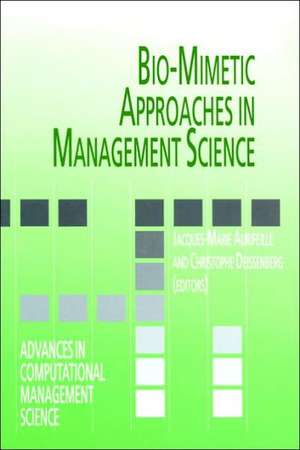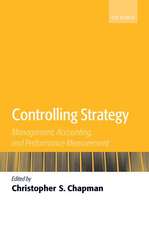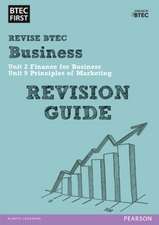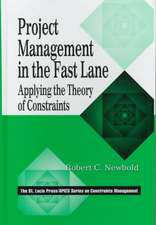Bio-Mimetic Approaches in Management Science: Advances in Computational Management Science, cartea 1
Editat de Jacques-Marie Aurifeille, Christopher Deissenbergen Limba Engleză Hardback – 30 apr 1998
Bio-Mimetic Approaches in Management Science presents a selection of recent papers on biomimetic approaches and their application to Management Science. Most of these papers were presented at the last ACSEG/CAEMS International Congresses (Approches Connexionnistes en Sciences Economiques et de Gestion/Connectionnist Approaches in Economics and Management Science). All papers combine the discussion of conceptual issues with illustrative empirical applications, and contain detailed information on the way heuristics are practically implemented. The advantages and limits of the biomimetic approaches are discussed in several of the papers, either by comparing these approaches with more classical methods (logit models, clustering), or by investigating specific issues like overfitting and robustness. Synthesizing overviews are provided, as well as new tools for coping with some of the limitations of biomimetic methods.
| Toate formatele și edițiile | Preț | Express |
|---|---|---|
| Paperback (1) | 638.43 lei 6-8 săpt. | |
| Springer Us – 19 noi 2010 | 638.43 lei 6-8 săpt. | |
| Hardback (1) | 643.34 lei 6-8 săpt. | |
| Springer Us – 30 apr 1998 | 643.34 lei 6-8 săpt. |
Preț: 643.34 lei
Preț vechi: 756.86 lei
-15% Nou
Puncte Express: 965
Preț estimativ în valută:
123.10€ • 134.14$ • 103.73£
123.10€ • 134.14$ • 103.73£
Carte tipărită la comandă
Livrare economică 23 aprilie-07 mai
Preluare comenzi: 021 569.72.76
Specificații
ISBN-13: 9780792349938
ISBN-10: 0792349938
Pagini: 228
Ilustrații: X, 208 p.
Dimensiuni: 155 x 235 x 18 mm
Greutate: 0.5 kg
Ediția:1998
Editura: Springer Us
Colecția Springer
Seria Advances in Computational Management Science
Locul publicării:New York, NY, United States
ISBN-10: 0792349938
Pagini: 228
Ilustrații: X, 208 p.
Dimensiuni: 155 x 235 x 18 mm
Greutate: 0.5 kg
Ediția:1998
Editura: Springer Us
Colecția Springer
Seria Advances in Computational Management Science
Locul publicării:New York, NY, United States
Public țintă
ResearchCuprins
1. The Potential of Neural Networks Evaluated within a Taxonomy of Marketing Applications.- 2. Complexity Control and Generalization in Multilayer Perceptrons.- 3. Application of Neural Networks to Bond Rating and House Pricing.- 4. Connexionist Approach and Corporate Distress Diagnosis: a Contribution to the Processing of Incomplete Information.- 5. Comparison of the Predictivity of a Neural Network with Backpropagation with those using Linear Regression, Logistic and A.LD. Methods for Direct Marketing Scoring.- 6. Comparison of Discriminant Analysis and Neural Networks Application for the Detection of Company Failures.- 7. Using Artificial Neural Nets to Specify and Estimate Aggregate Reference Price Models.- 8. Towards Connectionist Merchandising: a Conceptual and Operational Definition.- 9. A Statistical Methodology for Specifying Neural Network Models: Application to the Identification of Cross-selling Opportunities.- 10. Optimization by a Genetic Algorithm of Stochastic Linear Models of Time Series.- 11. A Bio-mimetic Clusterwise Regression Algorithm for Consumer Segmentation.- 12. Hybrid Genetic Learning of Hidden Markov Models For Time Series Prediction.- 13. Learning How to Regulate a Polluter with Unknown Characteristics: An Application of Genetic Algorithms to a Game of Dynamic Pollution Control.



























